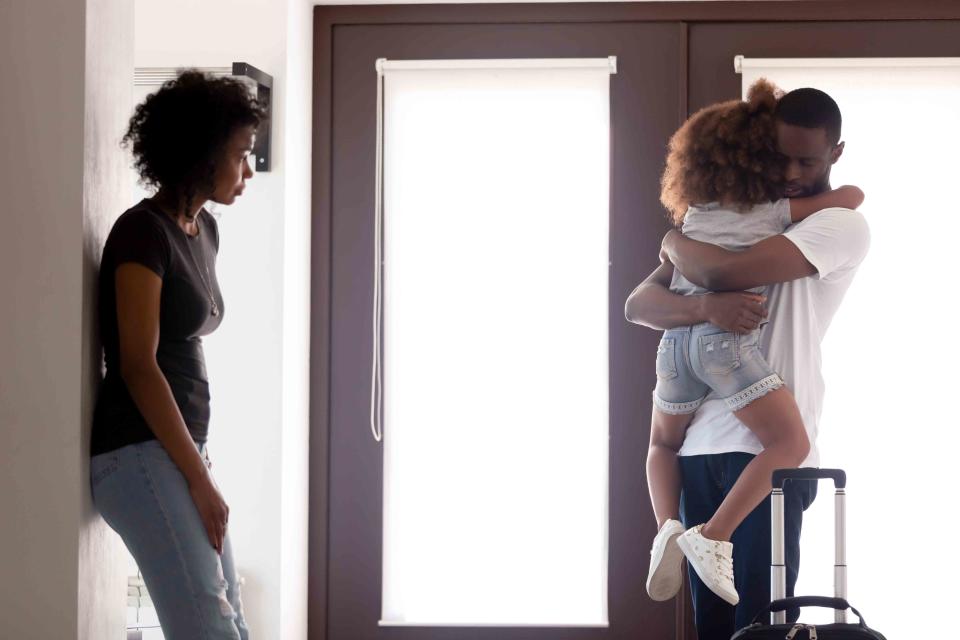TikTokers Share the Real and Emotional Toll of Co-Parenting
Parents are taking to social media to show just how hard it can be to be separated from their children for even short periods of time.

Fact checked by Sarah Scott
I boarded the ferry with my son in my arms, crossing over the Puget Sound to where his father waited on the other side. After handing over our little one, I waited on the dock for the return ferry to begin loading. Back on the ferry, watching the shoreline grow smaller and smaller, I felt as though my heart and limbs were missing. My introduction to co-parenting was less conventional and rather cinematic.
In the beginning years of co-parenting, we all feel the loneliness and pain of not having our child with us every day. While the years have passed, and my son’s father and I have grown and evolved along the journey, I know firsthand just how heavy an emotional toll co-parenting can take on all.
Parents new to this world, are sharing powerful videos on TikTok conveying these challenges. One of the most immediate experiences a new co-parent has is coming home to silence.
Tiktoker @ainjole shared, “When she is rowdy and loud, I wish for peace and quiet,” he says in a video reflecting his sadness coming home after dropping his daughter off at mom’s house. “But then I hate it when I have it,” as he turns off the light and lies in the darkness on his daughter's bed.
Yolanda Williams is a parenting coach with Parenting Decolonized. She coaches moms and dads about unpacking the feelings that come up for new co-parents. “It can feel really lonely and it brings up a lot of emotions around failure and feeling like you don't have a village anymore,” Williams shares.
“Many people end up isolating themselves because of shame and guilt,” she says, so her advice is to find a village and seek out support, be it in groups or as part of a community. “We need to actually reach out to more people and find other people who are going through some of the same things so you can talk to someone that understands.”
Tiktoker @therealistmads shared in her video the seven things she had to give up to have peaceful co-parenting. Like ainjole, she began with letting go of the need to see your children every day, but soon expanded into giving up the need to control the kids' routines with their father.
Sydney Swonigan, a co-parenting coach with Exes and Babies says many new co-parents struggle between household differences, especially when one parent is more or less “hands-on.”
“Acknowledge when there is a difference between households, especially if the child's bringing it up,” Swonigan advises. Explaining to your kid why there are different bedtimes at each home will teach your child that there are various ways to run a household. Anxious parents can relinquish that need for control, and develop the peace of mind that their child is learning a range of perspectives at a young age.
On Tiktok, @therealistmads continues, sharing they had to learn to release toxic cycles of communication. Swonigan guides co-parents by collectively developing a set of guiding principles for parenting and communication. “When things get sticky, parents can reference back to that and remember - we are actually operating as a team,” she says. The principles are an ongoing reminder, especially when a co-parent feels triggered, that they share the same vision - a happy, healthy kid.
Related: 7 Best Co-Parenting Apps to Download After Divorce
Closing out the TikTok, @therealistmads says setting and enforcing boundaries became high value to her peace, “Inner peace is essential when raising tiny humans, non-negotiable when co-parenting.”
Williams often finds many parents first need to understand what boundaries even are. She says many people conflate boundaries with rules because they haven’t learned the difference.
“Boundaries are about you and what you're going to allow, and not about trying to control other people,” she shared. She says people often give a person a rule and say that it is a boundary. By getting clear on what a boundary actually is, you can enforce them in healthy ways.
Williams uses the example, a rule can be “Don’t hit my child,” and the boundary would be, “If you hit my child, we will leave.” Conscious boundaries can keep everyone safe, she teaches.
In my own co-parenting struggles over the years, I often came to Prentis Hemphill’s words in my times of need, “Boundaries are the distance at which I can love you and me simultaneously.”
Williams and Swonigan support parents in becoming more cooperative, collaborative, and compassionate versions of themselves in the co-parenting spectrum. By always placing the children first, finding community, getting help and support from a mediator or coach, and learning more about themselves, all co-parents can find their way home again.
Related: When (and How) to Modify Child Support: A Primer for Single Parents
For more Parents news, make sure to sign up for our newsletter!
Read the original article on Parents.

